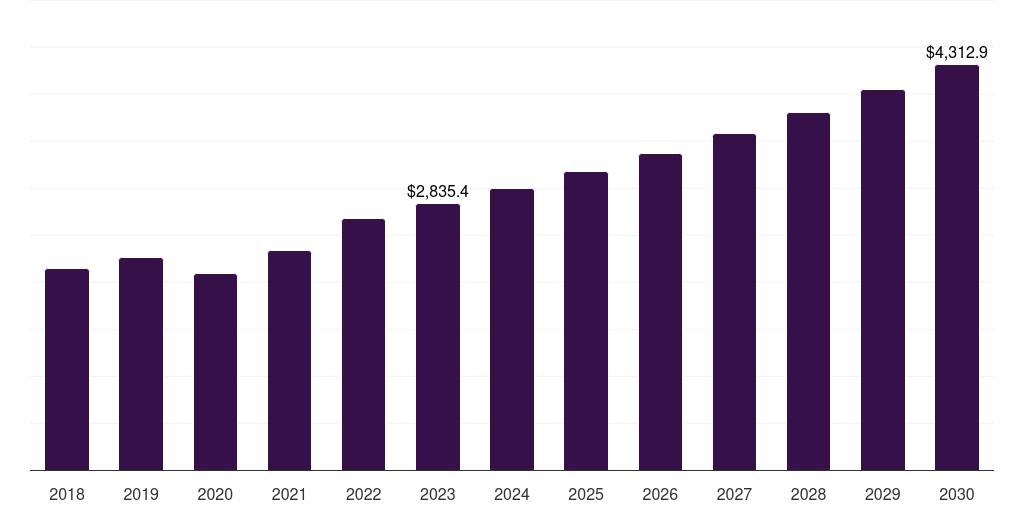Europe Breast Cancer Drugs Market Size & Outlook, 2023-2030
Europe breast cancer drugs, 2018-2030 (US$M)

Related Markets
Europe breast cancer drugs highlights
- The Europe breast cancer drugs generated a revenue of USD 2,835.4 million in 2023.
- The market is expected to grow at a CAGR of 6.2% from 2024 to 2030.
- In terms of segment, targeted therapy was the largest revenue generating therapy in 2023.
- Immunotherapy is the most lucrative therapy segment registering the fastest growth during the forecast period.
- Country-wise, Denmark is expected to register the highest CAGR from 2024 to 2030.
Europe data book summary
| Market revenue in 2023 | USD 2,835.4 million |
| Market revenue in 2030 | USD 4,312.9 million |
| Growth rate | 6.2% (CAGR from 2023 to 2030) |
| Largest segment | Targeted therapy |
| Fastest growing segment | Immunotherapy |
| Historical data covered | 2018 - 2022 |
| Base year for estimation | 2023 |
| Forecast period covered | 2024 - 2030 |
| Quantitative units | Revenue in USD million |
| Market segmentation | Chemotherapy, Immunotherapy, Targeted Therapy, Hormonal Therapy |
| Key market players worldwide | Novartis AG ADR, Pfizer Inc, Merck KGaA, Janssen Pharmaceuticals, Celgene, Roche Holding AG, AstraZeneca PLC, AbbVie Inc, Bristol-Myers Squibb Co, Macrogenics Inc, Celldex Therapeutics Inc, Sanofi SA, Amgen Inc |
Other key industry trends
- In terms of revenue, Europe region accounted for 33.0% of the global breast cancer drugs in 2023.
- Globally, North America is projected to lead the regional market in terms of revenue in 2030.
- Asia Pacific is the fastest growing regional market and is projected to reach USD 3,358.8 million by 2030.
No credit card required*
Horizon in a snapshot
- 30K+ Global Market Reports
- 120K+ Country Reports
- 1.2M+ Market Statistics
- 200K+ Company Profiles
- Industry insights and more
Breast Cancer Drugs Scope
Breast Cancer Drugs Companies
| Name | Profile | # Employees | HQ | Website |
|---|
Europe breast cancer drugs outlook
The databook is designed to serve as a comprehensive guide to navigating this sector. The databook focuses on market statistics denoted in the form of revenue and y-o-y growth and CAGR across the globe and regions. A detailed competitive and opportunity analyses related to breast cancer drugs will help companies and investors design strategic landscapes.
Targeted therapy was the largest segment with a revenue share of 64.24% in 2023. Horizon Databook has segmented the Europe breast cancer drugs based on chemotherapy, immunotherapy, targeted therapy, hormonal therapy covering the revenue growth of each sub-segment from 2018 to 2030.
The European market mainly consists of the UK, Germany, France, Italy, and Spain. Increasing prevalence of breast cancer, coupled with growing investments on R&D, is expected to drive the European market.
According to The European Breast Cancer Coalition, in the WHO European region and EU-28, the estimated incidence of breast cancer in 2018 was 562,500 and 404,920, respectively, whereas mortality was 150,700 and 98,735, respectively.
About 1 in 8 women below the age of 85 is expected to develop breast cancer in their lifetime. Furthermore, the introduction of a new drugs class, CDK 4/6 inhibitors, is expected to boost growth of the regional market. For instance, in August 2017, Kisqali, in combination with an aromatase inhibitor, received EU approval for treatment of metastatic breast cancer.
Reasons to subscribe to Europe breast cancer drugs databook:
-
Access to comprehensive data: Horizon Databook provides over 1 million market statistics and 20,000+ reports, offering extensive coverage across various industries and regions.
-
Informed decision making: Subscribers gain insights into market trends, customer preferences, and competitor strategies, empowering informed business decisions.
-
Cost-Effective solution: It's recognized as the world's most cost-effective market research database, offering high ROI through its vast repository of data and reports.
-
Customizable reports: Tailored reports and analytics allow companies to drill down into specific markets, demographics, or product segments, adapting to unique business needs.
-
Strategic advantage: By staying updated with the latest market intelligence, companies can stay ahead of competitors, anticipate industry shifts, and capitalize on emerging opportunities.
Target buyers of Europe breast cancer drugs databook
-
Our clientele includes a mix of breast cancer drugs companies, investment firms, advisory firms & academic institutions.
-
30% of our revenue is generated working with investment firms and helping them identify viable opportunity areas.
-
Approximately 65% of our revenue is generated working with competitive intelligence & market intelligence teams of market participants (manufacturers, service providers, etc.).
-
The rest of the revenue is generated working with academic and research not-for-profit institutes. We do our bit of pro-bono by working with these institutions at subsidized rates.
Horizon Databook provides a detailed overview of continent-level data and insights on the Europe breast cancer drugs, including forecasts for subscribers. This continent databook contains high-level insights into Europe breast cancer drugs from 2018 to 2030, including revenue numbers, major trends, and company profiles.
Partial client list
Europe breast cancer drugs market size, by country, 2018-2030 (US$M)
Europe Breast Cancer Drugs Share, 2023 & 2030 (US$M)
Related industry reports
Related regional statistics
No records
No related regions found.
Sign up - it's easy, and free!
Sign up and get instant basic access to databook, upgrade
when ready, or enjoy our
free plan indefinitely.
Included in Horizon account
- 30K+ Global Market Reports
- 120K+ Country Reports
- 1.2M+ Market Statistics
- 200K+ Company Profiles
- Industry insights and more



